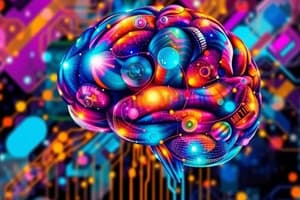Podcast
Questions and Answers
What distinguishes deep learning models from traditional machine learning algorithms?
What distinguishes deep learning models from traditional machine learning algorithms?
- Limited application to image recognition
- Ability to perform basic arithmetic operations
- Automatic extraction of hierarchical data representations (correct)
- Use of neural networks with one layer
Which technology focuses on helping computers understand, interpret, and generate human language?
Which technology focuses on helping computers understand, interpret, and generate human language?
- Voice Recognition Technology
- Machine Learning Automation
- Deep Neural Networks
- Natural Language Programming (NLP) (correct)
In which industry is AI commonly used for predictive modeling and drug discovery?
In which industry is AI commonly used for predictive modeling and drug discovery?
- Entertainment
- Transportation
- Healthcare (correct)
- Finance
What is one of the major applications of AI in the transportation sector?
What is one of the major applications of AI in the transportation sector?
What is a common ethical concern associated with AI technology?
What is a common ethical concern associated with AI technology?
Which sector benefits from AI applications such as fraud detection and algorithmic trading?
Which sector benefits from AI applications such as fraud detection and algorithmic trading?
What is the primary focus of Artificial Intelligence (AI)?
What is the primary focus of Artificial Intelligence (AI)?
Which of the following best describes narrow (or weak) AI?
Which of the following best describes narrow (or weak) AI?
What is machine learning, in the context of AI?
What is machine learning, in the context of AI?
Which of the following is NOT a core element of AI mentioned in the text?
Which of the following is NOT a core element of AI mentioned in the text?
What is the primary goal of general (or strong) AI?
What is the primary goal of general (or strong) AI?
How has the development and implementation of AI technologies impacted various industries?
How has the development and implementation of AI technologies impacted various industries?
Flashcards are hidden until you start studying
Study Notes
Introduction to AI (Artificial Intelligence)
AI stands for artificial intelligence, a field of computer science that focuses on creating intelligent machines capable of performing tasks that would normally require human intervention or decision-making abilities. The development and implementation of AI technologies have revolutionized various industries, enabling more automated processes, data analysis, and predictive modeling. In this article, we will explore the concept of AI, its applications, and its impact on different sectors.
Understanding AI
AI is defined as the simulation of human intelligence processes by machines, especially computer systems. These processes include learning, reasoning, problem-solving, perception, and language understanding. AI can be categorized into two main types: narrow (or weak) AI and general (or strong) AI. Narrow AI is designed for specific tasks, such as image recognition or speech synthesis, while general AI aims to mimic all aspects of human cognitive ability, including consciousness, self-awareness, and creativity [1, 3].
Key Elements of AI
The core elements of AI are:
Machine Learning
Machine learning is a subset of AI that enables systems to learn from data without explicit programming. It involves algorithms that automatically improve their performance based on patterns found in input data.
Deep Learning
Deep learning is a subfield of machine learning that uses neural networks with multiple layers for pattern recognition and prediction. These layers allow deep learning models to automatically extract hierarchical representations of data, enabling them to perform better than traditional machine learning algorithms on complex tasks such as image recognition and speech processing.
Natural Language Processing (NLP)
NLP is another branch of AI that focuses on helping computers understand, interpret, and generate human language. This technology powers voice assistants like Siri and Alexa, as well as chatbot applications used in customer service and support systems.
Applications of AI
AI has found numerous applications across various industries, including healthcare, finance, transportation, and entertainment. Some of the most common uses of AI include:
Healthcare
AI is used for predictive modeling, drug discovery, medical imaging, and patient monitoring. Machine learning algorithms analyze vast amounts of health data to identify patterns and correlations, leading to improved patient outcomes and more efficient healthcare delivery.
Finance
Financial institutions employ AI for fraud detection, risk assessment, portfolio management, and algorithmic trading. Deep learning techniques enable accurate predictions of market trends and investment strategies, maximizing returns while minimizing risks.
Transportation
Self-driving cars, route optimization, and predictive maintenance are among the major applications of AI in the transportation sector. These technologies enhance safety, efficiency, and overall performance of vehicles and logistics networks.
Entertainment
AI applications in entertainment include content recommendation systems, game design, and voice-activated devices. These innovations offer personalized user experiences and facilitate interaction with digital content.
Ethical Considerations and Challenges
While AI offers significant benefits, it also raises concerns regarding privacy, security, and ethical implications. Issues surrounding data ownership, misinformation, and potential job displacement due to automation must be addressed. Additionally, ensuring safe integration of autonomous systems into society remains a critical challenge.
Studying That Suits You
Use AI to generate personalized quizzes and flashcards to suit your learning preferences.




